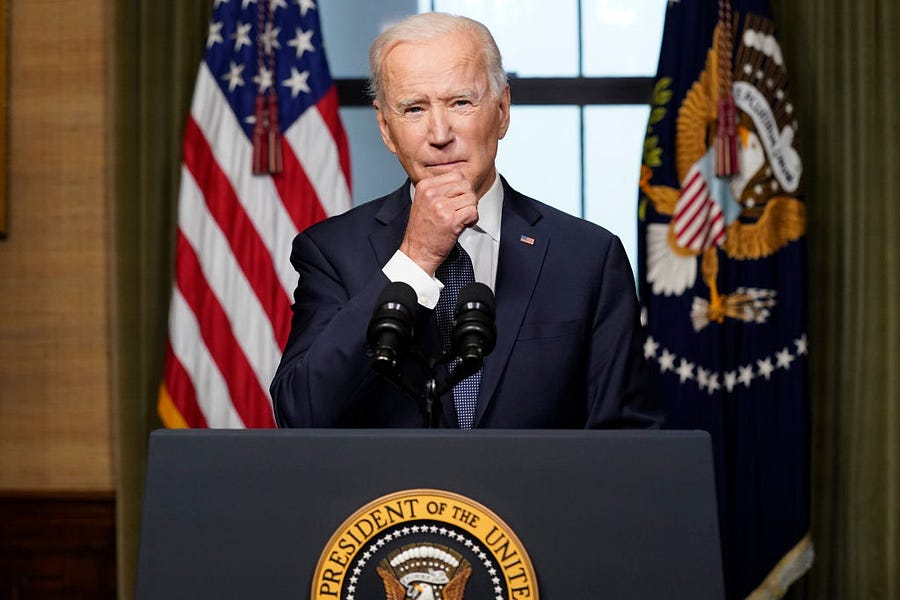Happy Sunday! We had a real “I can’t believe we’re still doing this” moment this week in the Ohio bureau. Our youngest son turned 12, meaning he’s now had two pandemic birthdays. It was certainly better than last year’s—he went to school in person, he got to see his grandparents, and he played his first baseball game of the season. But it still feels like he’s been cheated.
What really bummed me out, though, is that I tried to think back on what his birthday was like a year ago, and … I had to turn to my Facebook memories and the camera roll on my phone. I remember the general vibe of those early months of the pandemic—the eeriness of empty highways and parking lots, the jokes about walking the dog six times a day, getting sucked into Tiger King. But a lot of the details kind of run together. Thankfully, the photos reminded me that I actually pulled out the KitchenAid mixer I got for Christmas a few years ago and Wilson and I baked his cake together. One of his presents was a party game, because we did try to have some family activity most nights. But I hated that I couldn’t remember the specifics.
Which is why I’m looking forward to being on the other side of this thing, for good. I’m at the age where, with my childbearing years barely even visible in the rearview mirror, I like to offer unsolicited advice to new and expectant parents. One thing I tell them is that, “It’s OK. You’ll forget the sleepless nights, the teething, the tantrums. It’s like your brain has a self-defense mechanism.” It’s largely true, I think. And there are definitely a few similarities between being a new parent and living through a pandemic. Your world changes drastically and suddenly, you have to learn whole new ways of doing even basic tasks, and you can’t go anywhere. But there’s no doubt that while your brain might be trying to block out the unpleasantry, you forget some of the good stuff along the way.
The pandemic and the upheaval it has wrought have exacted far heavier tolls than making us want to forget the last year, obviously. Lost lives, lost businesses and jobs, learning gaps. It’s not crazy to think it contributed at least in part to the spike in murders and violent crime we are seeing. So it feels a little petty to complain about not remembering big days. But another tip I like to give to new parents is that “the days are long but the years are short.” I touched on this a little last week when I wrote about taking our oldest on a college tour. Even if you’re proud to see them grow up, there are times you just want to go back when they were playing tee-ball or learning how to read. To think that a whole year was spent in a fog is frustrating.
So, yes, I’m more than ready for this to be over. Which is why I was grateful for the forceful statement Florida Gov. Ron DeSantis made this week about vaccines: “If you get a vaccine … you’re immune. So act immune.”
It’s hard to say if the overly cautious statements coming from public health experts or the pause on the Johnson & Johnson vaccine are contributing to any vaccine hesitancy. My own social media feeds are full of people bragging about their shots. But it’s harder to think about getting back to normal when the message is that, even when we’re immune, we have to keep living the lockdown life.
Now, for our best stuff from this week.
Many small businesses have taken a hit during the pandemic: Lockdowns forced closures and reduced capacities, and people have been reluctant to venture out even amid reopenings. But another problem—less often discussed—is that business owners are finding it nearly impossible to hire workers. Steve talked to the owners of Dale’s Diner in northwest Ohio, of Juana’s Pagodas in the Florida Panhandle, and a textile producer in Wisconsin about their plight. All believe that the government’s enhanced federal unemployment benefits—$300 a week through September, thanks to the Biden administration’s $1.9 trillion stimulus package—are hindering their efforts. Workers can make more by staying home. “With vaccinations ramping up quickly and more Americans comfortable returning to pre-pandemic activities, these same workers are needed to get the economy moving and to keep businesses open,” Steve writes. “But with the extension of a policy designed to keep workers home, it’s not surprising that many of them are doing just that.”
Okay, we might have gone a little heavy on our reaction to President Biden’s announcement that he would withdraw all U.S. troops from Afghanistan by September 11, 2021. But we had the voices you wanted to hear on this. Tom Joscelyn is one of the foremost experts on Afghanistan, al-Qaeda, and the larger war on terror. (Tom and Steve were instrumental to getting the trove of documents from Osama bin Laden’s Abbotabad compound released.) Tom was a big critic of the Trump administration’s withdrawal deal, which could have brought our troops home on May 1. He’s no more impressed by Biden’s plan. He critiques Biden’s reasoning as flawed. “The president believes America can manage terrorism emanating from the region without maintaining a footprint in Afghanistan. This is called the ‘over the horizon’ model, a term Biden used to describe striking targets from afar. But the operation that netted bin Laden is a good example of why this won’t work.” David also weighed in in The French Press (🔒). David served in Iraq and uses his experience there to point out other problems with the withdrawal. For all the talk of this being a “loss,” he points out correctly that the military hasn’t lost. It’s accomplished everything it can. “Yes, we have failed at the nearly impossible, optional tasks that would positively transform nations and cultures, but we have accomplished the necessary, mandatory tasks that keep our enemies at bay and keep Americans safe,” he writes. And don’t miss Jonah’s column chiding Biden for putting feelings over facts.
J.D. Vance is an all-but-declared candidate for the Ohio Senate opening created by Rob Portman’s coming retirement. He’s running as a Republican, but Jonah noticed he’s sounding a lot like … Bernie Sanders. In response to the news that representatives from 100 different corporations had a giant conference call to discuss how to react to election reform bills going through state legislatures, he tweeted: “Raise their taxes and do whatever else is necessary to fight these goons. We can have an American Republic or a global oligarchy, and it’s time for choosing.” Jonah sallies all of Vance’s anti-corporate arguments and points out: “And about this ‘global oligarchy.’ The idea is a conspiracy theory, no different than Bernie Sanders’ prattling about the One Percent. Sanders often assumes that any political obstacles he faces are the result of ‘millionaires and billionaires’ manipulating the system. And so does Vance.”
And here’s the best of the rest:
-
In The Sweep, Sarah gets a jump on the 2022 Senate races in Georgia and North Carolina and the governor’s race in Arkansas, looking at how candidates decide when to enter the race—early to raise money, or late to “wait until other candidates lose that new car smell.”
-
Talks began in Vienna this week on reviving the Iran nuclear deal that the Obama administration negotiated in 2015 and that the Trump administration withdrew from in 2018. But Iran just announced it would begin enriching uranium at 60 percent purity. Is now the time to jump back in? Check out Charlotte’s great piece.
-
Infrastructure Week was a long-running joke during the Trump administration, but it’s happening for real now as senators began discussing a potential $800 billion package for roads, broadband, water systems, and other traditional forms of infrastructure. Haley has the details in Uphill (🔒).
-
President Biden announced a commission to look into expanding the Supreme Court and other judicial branch reform. The Cato Institute’s Ilya Shapiro is not impressed.
-
For the history buffs, Thomas Koenig has a review of Dennis C. Rasmussen’s new book, Fears of a Setting Sun: The Disillusionment of America’s Founders, about how the Founding Fathers came to despair over the future of the American experiment.
-
It was a banner week on the pods: On Advisory Opinions, David and Sarah discuss the Derek Chauvin trial and whether he’s likely to be convicted. On The Dispatch Podcast, the gang talks about the Johnson & Johnson vaccine pause. Lastly, pour yourself some Jameson: on The Remnant, Jonah and Mike Gallagher reunite to debate “half-baked ideas” like buying Greenland, requiring presidential candidates to pass the Presidential Physical Fitness Test, and something about babies generating static electricity by crawling over shag carpeting.








Please note that we at The Dispatch hold ourselves, our work, and our commenters to a higher standard than other places on the internet. We welcome comments that foster genuine debate or discussion—including comments critical of us or our work—but responses that include ad hominem attacks on fellow Dispatch members or are intended to stoke fear and anger may be moderated.
You are currently using a limited time guest pass and do not have access to commenting. Consider subscribing to join the conversation.
With your membership, you only have the ability to comment on The Morning Dispatch articles. Consider upgrading to join the conversation everywhere.